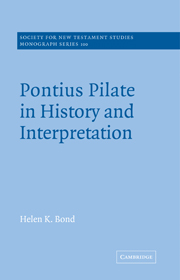Book contents
- Frontmatter
- Contents
- Preface
- Acknowledgements
- Abbreviations
- Map of the Roman province of Judaea, 6–41 ce
- 1 Pontius Pilate and the Roman province of Judaea
- 2 Pilate in Philo
- 3 Pilate in Josephus
- 4 Pilate in Mark's gospel
- 5 Pilate in Matthew's gospel
- 6 Pilate in Luke-Acts
- 7 Pilate in John's gospel
- 8 Historical events behind the gospel narratives
- 9 Conclusion
- Bibliography
- Index of texts cited
- Index of modern authors
- Index of main subjects
1 - Pontius Pilate and the Roman province of Judaea
Published online by Cambridge University Press: 18 December 2009
- Frontmatter
- Contents
- Preface
- Acknowledgements
- Abbreviations
- Map of the Roman province of Judaea, 6–41 ce
- 1 Pontius Pilate and the Roman province of Judaea
- 2 Pilate in Philo
- 3 Pilate in Josephus
- 4 Pilate in Mark's gospel
- 5 Pilate in Matthew's gospel
- 6 Pilate in Luke-Acts
- 7 Pilate in John's gospel
- 8 Historical events behind the gospel narratives
- 9 Conclusion
- Bibliography
- Index of texts cited
- Index of modern authors
- Index of main subjects
Summary
Pontius Pilate was the fifth governor of the Roman province of Judaea, holding office from 26–37 ce. The small province had been brought under Roman rule only two decades earlier. The events which led to this, however, go back another decade still to the death of Herod I in 4 bce.
In the final codicil of his will, the king divided his kingdom between three of his sons: Philip and Antipas received a quarter each; the remaining half, including Judaea, was to go to Archelaus. Since Herod I was a vassal king, or rex socius, it lay with Augustus either to ratify the will as it stood or to appoint another successor. Both Archelaus and Antipas journeyed to Rome: Archelaus anxious to have his succession ratified; Antipas to plead for the greater legitimation of an earlier will in which he had been named as sole heir. The two Herodians were joined by a group of relatives who, according to Josephus, openly supported Antipas but whose real purpose in appearing before the Emperor was to secure direct Roman rule over the former kingdom. This sentiment was shared by yet another delegation composed of fifty delegates from Judaea, supposedly joined by eight thousand Jews living in the capital, who pleaded with Augustus to unite their country to Syria and to entrust the administration to the Syrian legate. Clearly Josephus would have us believe that both the people and the nobility of Judaea would prefer to be governed by Romans rather than a successor of Herod.
- Type
- Chapter
- Information
- Pontius Pilate in History and Interpretation , pp. 1 - 23Publisher: Cambridge University PressPrint publication year: 1998



